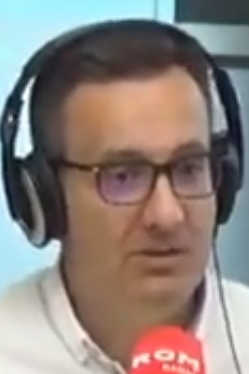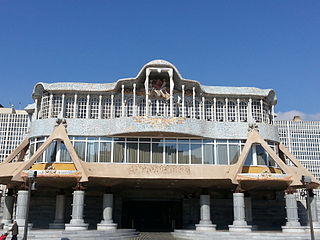
Murcia ) is a city in south-eastern Spain, the capital and most populous city of the autonomous community of the Region of Murcia, and the seventh largest city in the country. It had a population of 460,349 inhabitants in 2021. The total population of the metropolitan area is 672,773 in 2020, covering an urban area of 1,230.9 km2. It is located on the Segura River, in the southeast of the Iberian Peninsula. It has a climate with hot summers, mild winters, and relatively low precipitation.
Isaac Jové Rubí is a Spanish retired footballer who played as an attacking midfielder, currently a manager.

The 2011 Murcian regional election was held on Sunday, 22 May 2011, to elect the 8th Regional Assembly of the autonomous community of the Region of Murcia. All 45 seats in the Regional Assembly were up for election. The election was held simultaneously with regional elections in twelve other autonomous communities and local elections all throughout Spain.

Cartagena is a Spanish city and a major naval station on the Mediterranean coast, south-eastern Iberia. As of January 2018, it has a population of 218,943 inhabitants. This makes Cartagena the Murcia region's second-largest municipality and Spain's sixth-largest city that is not a provincial-capital. The wider urban or metropolitan area of Cartagena, known as Campo de Cartagena, has a population of 409,586 inhabitants.

The 2015 Murcian regional election was held on Sunday, 24 May 2015, to elect the 9th Regional Assembly of the autonomous community of the Region of Murcia. All 45 seats in the Regional Assembly were up for election. The election was held simultaneously with regional elections in twelve other autonomous communities and local elections all throughout Spain.

The 1983 Murcian regional election was held on Sunday, 8 May 1983, to elect the 1st Regional Assembly of the autonomous community of the Region of Murcia. All 43 seats in the Regional Assembly were up for election. The election was held simultaneously with regional elections in twelve other autonomous communities and local elections all throughout Spain.

The 1995 Murcian regional election was held on Sunday, 28 May 1995, to elect the 4th Regional Assembly of the autonomous community of the Region of Murcia. All 45 seats in the Regional Assembly were up for election. The election was held simultaneously with regional elections in twelve other autonomous communities and local elections all throughout Spain.

The 2007 Murcian regional election was held on Sunday, 27 May 2007, to elect the 7th Regional Assembly of the autonomous community of the Region of Murcia. All 45 seats in the Regional Assembly were up for election. The election was held simultaneously with regional elections in twelve other autonomous communities and local elections all throughout Spain.

The 2019 Madrid City Council election, also the 2019 Madrid municipal election, was held on Sunday, 26 May 2019, to elect the 11th City Council of the municipality of Madrid. All 57 seats in the City Council were up for election. The election was held simultaneously with regional elections in twelve autonomous communities and local elections all throughout Spain, as well as the 2019 European Parliament election.

The 2019 Murcian regional election was held on Sunday, 26 May 2019, to elect the 10th Regional Assembly of the autonomous community of the Region of Murcia. All 45 seats in the Regional Assembly were up for election. The election was held simultaneously with regional elections in eleven other autonomous communities and local elections all throughout Spain, as well as the 2019 European Parliament election.
In the run up to the 2019 Spanish local elections, various organisations carried out opinion polling to gauge voting intention in local entities in Spain. Results of such polls for municipalities in the Region of Murcia are displayed in this article. The date range for these opinion polls is from the previous local elections, held on 24 May 2015, to the day the next elections were held, on 26 May 2019.

The 2023 Murcian regional election was held on Sunday, 28 May 2023, to elect the 11th Regional Assembly of the autonomous community of the Region of Murcia. All 45 seats in the Regional Assembly were up for election. The election was held simultaneously with regional elections in eleven other autonomous communities and local elections all throughout Spain.

The second government of Fernando López Miras was formed on 1 August 2019, following the latter's election as President of the Region of Murcia by the Regional Assembly of Murcia on 26 July and his swearing-in on 29 July, as a result of the People's Party (PP) allying itself with Citizens (Cs) and mustering the external support from Vox in exchange for policy compromises following the 2019 Murcian regional election. It succeeded the first López Miras government and has been the incumbent government of the Region of Murcia since 1 August 2019, a total of 1,491 days, or 4 years and 30 days.

El Algar is a district of the Spanish municipality Cartagena. It is located in the east of Cartagena and has an area of 26.659 km2. It shares borders with Lentiscar at its north, San Félix at its east, La Unión municipality at its south east, El Beal at its south-west and a coastal salty lagoon named Mar Menor at its north-west. In 2019, 7,961 people were registered as inhabitants of the district.
This is the results breakdown of the local elections held in the Region of Murcia on 26 May 2019. The following tables show detailed results in the autonomous community's most populous municipalities, sorted alphabetically.

The 2023 Seville City Council election, also the 2023 Seville municipal election, was held on Sunday, 28 May 2023, to elect the 12th City Council of the municipality of Seville. All 31 seats in the City Council were up for election. The election was held simultaneously with regional elections in twelve autonomous communities and local elections all throughout Spain.

José Francisco Ballesta Germán is a Spanish medical professor and politician. A full professor at the University of Murcia since 1992, he served as the university's president from 1998 to 2006. As a People's Party politician, he was the mayor of Murcia and a minister in the Government of the Region of Murcia (2007–2014).
In the run up to the 2023 Spanish local elections, various organisations carry out opinion polling to gauge voting intention in local entities in Spain. Results of such polls for municipalities in the Region of Murcia are displayed in this article. The date range for these opinion polls is from the previous local elections, held on 26 May 2019, to the day the next elections will be held, on 28 May 2023.

The 10th Assembly of Murcia is the current meeting of the Regional Assembly of Murcia, with the membership determined by the results of the 2019 regional election held on 26 May 2019. The parliament met for the first time on 11 June 2019. According to the Statute of Autonomy of Murcia the maximum legislative term of assembly is 4 years from the preceding election.

Escuela de Fútbol Club Deportivo Algar is a Spanish football club based in El Algar, Cartagena in the Region of Murcia. Founded in 1930, they play in Preferente Autonómica de Murcia – Group 1, holding home games at Estadio Sánchez Luengo, with a capacity of 1,000 seats.













